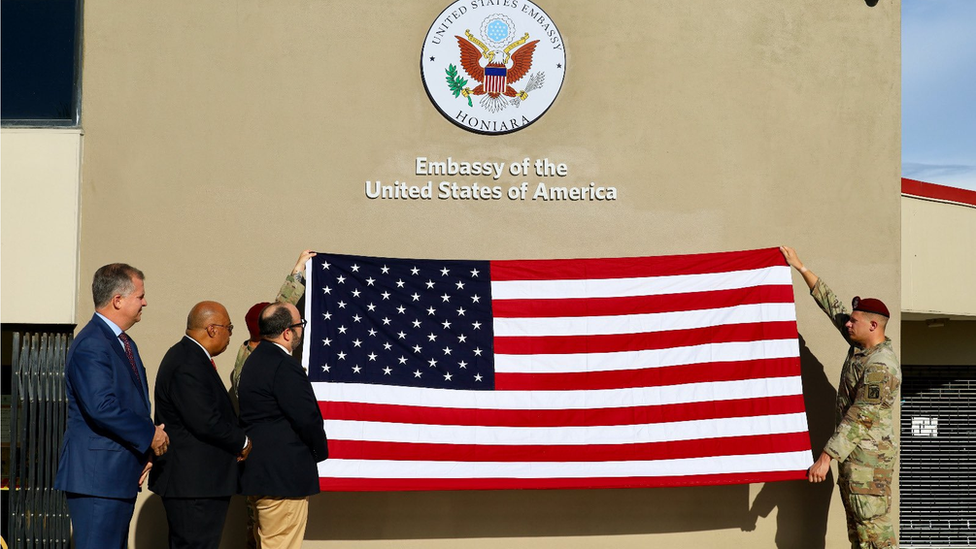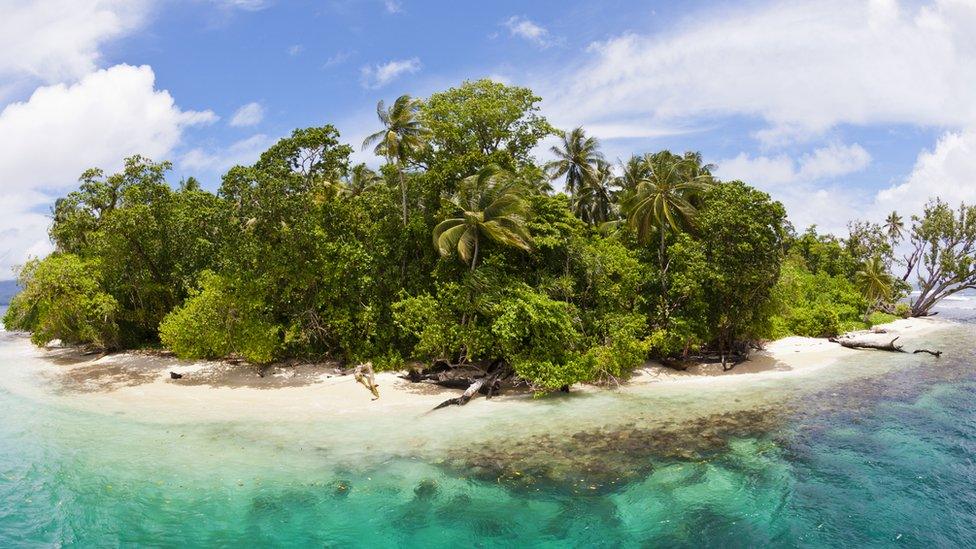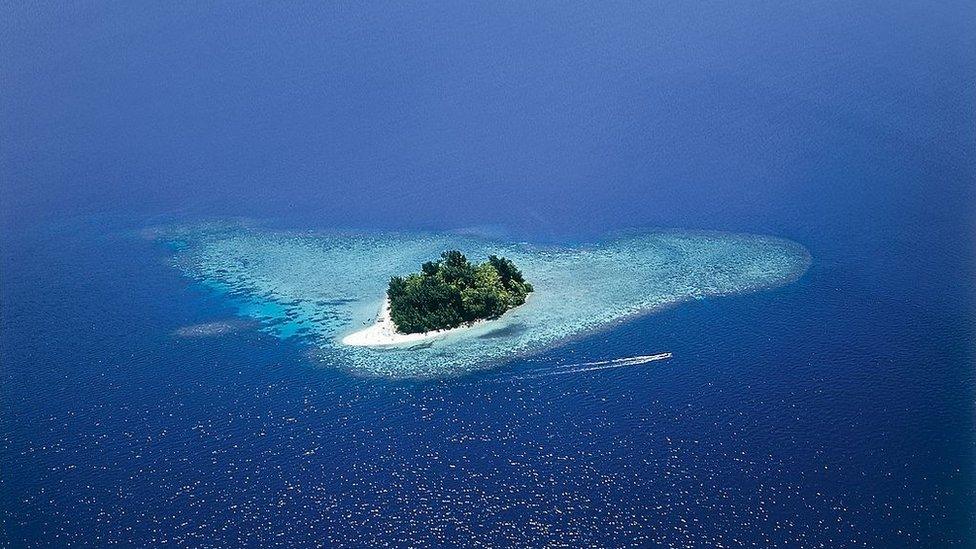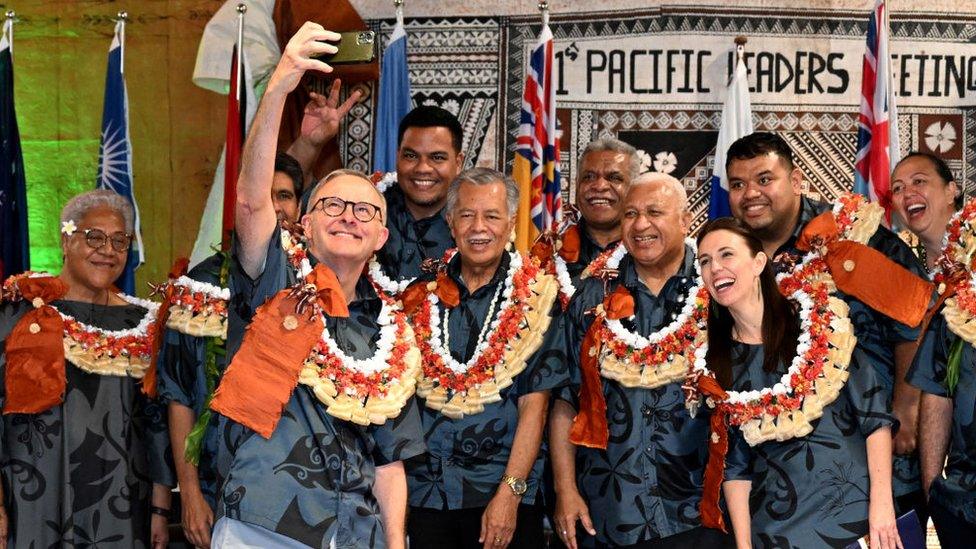Solomon Islands: US reopens embassy in push to counter China
- Published

Washington has re-established a diplomatic presence on the Solomon Island after a 30-year absence
The US has reopened its Solomon Islands embassy in a move widely seen as shoring up influence in the Pacific to counter China's push into the region.
Last year Washington and its allies were blindsided when the tiny nation signed a security deal with Beijing.
It came after the US had already said it would reopen its Honiara post - closed in 1993 - amid concerns over China's growing military ambitions.
The Solomons PM did not attend the embassy's opening on Wednesday.
However a foreign ministry spokesman said the re-established US embassy was welcomed by the government.
The region is strategically crucial for the US as a gateway to Asia for Pacific allies like Australia. Washington's diplomatic presence has until now largely been centred in its Papua New Guinea post.
But US Secretary of State Antony Blinken on Wednesday said the Honiara embassy would help advance the US-Pacific partnership goals - signed last year - of keeping the region a place where "democracy can flourish".
The embassy opening comes at "an important moment for the region we share", he said in a video statement.
"Because more than any other part of the world - the Indo-Pacific region including the Pacific islands - will shape the world's trajectory in the 21st Century."
Allow X content?
This article contains content provided by X. We ask for your permission before anything is loaded, as they may be using cookies and other technologies. You may want to read X’s cookie policy, external and privacy policy, external before accepting. To view this content choose ‘accept and continue’.

Concerns about Beijing's increasing influence and military expansion in the Pacific has prompted the US and Australia to step up their focus there in recent years.
Last September, US President Joe Biden invited 14 Pacific island nations to the White House for the first-ever in-person summit. Washington signed a sweeping partnership and development agreement with the island nations.
Solomon Islands PM Manasseh Sogavare also signed up to the deal despite reports in the lead-up that he might abstain.
Beijing last year had also accelerated efforts to gain influence in the region - to mixed effect.
While it inked a security deal with the Solomons in March, it failed to secure a trade and security deal with 10 regional countries a few months later despite a lobbying tour from China's then Foreign Minister Wang Yi.
"China has no intention of competing with anyone, let alone engaging in geopolitical competition, and has never established a so-called sphere of influence," said Mr Wang during the tour.
In recent times, Fiji, one of the biggest and most influential Pacific islands, has also announced it will cancel a police training exchange with China - formerly a close partner.
Fiji's new government - elected in December - has indicated it prefers stronger ties with its traditional Pacific partners Australia and New Zealand over China.
Australia and NZ are also both members of the Pacific Islands Forum (PIF) - the region's main bloc.
Several Pacific countries have advocated for regional unity in the face of superpower tensions and on Monday, many welcomed the announcement that Kiribati would return as a member.
Kiribati had withdrawn from the PIF last year in a move the country's opposition said had been influenced by Beijing. The country's leader had then said the forum wasn't adequately addressing the concerns of Micronesian countries.
Dr Meg Keen from the Australia-based Lowy Institute said the US re-engagement was welcomed but it would remain to be seen "if the announcements are backed up by actions".
She said the region could see a "diverse range of partnerships" as Pacific islands pursue development goals and funding.
The new US embassy also comes as Washington has been re-negotiating agreements with three island nations in the North Pacific - Micronesia, Palau and the Marshall Islands - who give exclusive military use rights to the US.
Related topics
- Published12 February 2022

- Published6 August 2022

- Published16 July 2022
